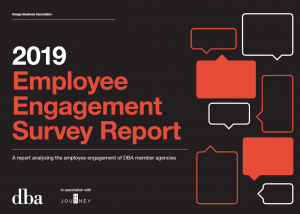Main Content

The power of internal communication
By Aliya Vigor-Robertson, co-founder of JourneyHR
Employee engagement is a vitally important part of any successful business and we were delighted to collaborate with the DBA on its first Employee Engagement Survey and thankful to all the agencies that took part and provided us with great insight.
While there are many factors that can affect how employees feel at work, fundamental to keeping employees engaged, happy and in tune with the direction of the business lies within communication.
Effective communication helps develop strong teams, build trust and ensure employees understand the vision and goals of the business.
This year a large number of agencies that took part in the survey were SMEs and what we have come to see is that small, growing agencies often face the challenge of having a workforce unclear of their roles. This can happen as agencies start to hire more people with different specialisms and work with more clients.
 If leaders fail to clearly communicate what each employee’s role entails and their position within the team, it can cause projects to fail, people to feel disengaged, productivity to dip and the creation of a blame culture where no one takes responsibility. Providing clarity doesn’t necessarily mean re-writing everyone’s job role – although this can be very helpful – but ensuring employees understand their responsibilities and what they are accountable for. The key is to be concise, keep it simple and make the conversation a two-way process.
If leaders fail to clearly communicate what each employee’s role entails and their position within the team, it can cause projects to fail, people to feel disengaged, productivity to dip and the creation of a blame culture where no one takes responsibility. Providing clarity doesn’t necessarily mean re-writing everyone’s job role – although this can be very helpful – but ensuring employees understand their responsibilities and what they are accountable for. The key is to be concise, keep it simple and make the conversation a two-way process.
Being clear on roles and responsibilities will also give employees a better idea of their career path within the business. The findings from the survey showed that just over half (53%) have a clear understanding of their career or promotion path, meaning there is still a large number of people who need greater guidance and direction from their managers. Talking about career progression in a traditional sense can be hard in an organisation where senior roles are filled and promotions are not possible. Could leaders be talking to their teams and thinking about development and growth through a different lens? Does career progression have to involve managing people or a new job title?
 In addition, leaders are responsible for communicating the visions and values of the business with their staff. The importance of ensuring everyone understands these, should not be underestimated; they help guide decision-making, shape behaviours and culture and crucially, provide employees with a sense of purpose. If everyone understands how their role contributes to the success and direction of the business, they are much more likely to feel motivated and engaged.
In addition, leaders are responsible for communicating the visions and values of the business with their staff. The importance of ensuring everyone understands these, should not be underestimated; they help guide decision-making, shape behaviours and culture and crucially, provide employees with a sense of purpose. If everyone understands how their role contributes to the success and direction of the business, they are much more likely to feel motivated and engaged.
Encouragingly, the results of the survey showed that 83% of employees understand the relationship between their work and the goals of the organisation and 78% believe in their organisation’s goals.
Strong communication can also help bind employees together and create an environment where people can be open and honest. We often hear that employees in design agencies feel like their place of work has a family feel to it. While this has many benefits, it can sometimes create a culture where having difficult conversations is swept under the carpet for fear of upsetting someone.
However, the absence of feedback – especially those difficult conversations – can hinder people from developing, improving and crucially, moving on. Interestingly, the results of the survey showed poor communication was the third largest obstacle holding employees back.
Leaders have a responsibility to make sure everyone has the right tools to communicate effectively with each other and their manager and not wait for their appraisal, or until things go very wrong.
Regular feedback, both in the form of appraisals and informal catch ups, as well as an open-door policy should be par for the course, encouraging people to perform to the best of their ability at all levels, air any issues and build a more robust, positive and collaborative environment.
 But communication isn’t a one-way street. Businesses also need to be open in their communication with employees. Only two thirds (64%) of respondents said they feel informed about important changes taking place across the business.
But communication isn’t a one-way street. Businesses also need to be open in their communication with employees. Only two thirds (64%) of respondents said they feel informed about important changes taking place across the business.
Employees should understand the commercials and financials of the business, both good and bad. It doesn’t need to be in fine detail, but enough to provide employees with a clear idea of how the business is faring. If staff are left to second guess or kept completely in the dark, they’ll feel insecure and this can have a knock-on impact on engagement levels.
 Not surprisingly, smaller teams, with 10 or fewer employees, were found to be more satisfied with internal communications at their workplace, likely because their size means that have greater access to both senior and junior colleagues. It also means their voice is more likely to be heard and this is a key factor for businesses of all sizes.
Not surprisingly, smaller teams, with 10 or fewer employees, were found to be more satisfied with internal communications at their workplace, likely because their size means that have greater access to both senior and junior colleagues. It also means their voice is more likely to be heard and this is a key factor for businesses of all sizes.
The launch of the DBA Employee Engagement Survey has been a great example of encouraging employees to give feedback and listen. When employees believe that their feelings and suggestions count, they’re much more likely to feel respected, engaged and loyal to the company. It also helps leaders understand the health of their business – both what they do well and what they could improve upon.
For those that did well, they have set the bar high and should continue to work hard to get the same or even better results next year. For those who have some work to do, it’s important to communicate to their teams that they have heard their feedback, understand what needs to be done and have a plan to improve things.
But a one-off engagement survey won’t suffice. To be a good employer who shows they really care about how their staff feel and recognize the importance of creating a great culture, we would encourage agencies to keep track of their engagement levels by participating each year. It’s a genuine honour to work with agencies who are doing such a brilliant job at creating great places to work where people are thriving.

About: Aliya Vigor-Robertson
Aliya started her HR career in 1996 and co-founded JourneyHR in 2010. Aliya works with Founders and business leaders in the creative industry and advises them on creating sustainable and creative cultures where their people can thrive and their businesses get great results.
Aliya is also a DBA Expert. Find out more about the DBA’s experts register and how our specialists could make a positive difference to your business here.
Image credits:
DBA Employee Engagement Survey Report | DBA
Dylan Gillis | Unsplash
Elena Koycheva | Unsplash
William | Unsplash
Tom Hill | Unsplash

 If leaders fail to clearly communicate what each employee’s role entails and their position within the team, it can cause projects to fail, people to feel disengaged, productivity to dip and the creation of a blame culture where no one takes responsibility. Providing clarity doesn’t necessarily mean re-writing everyone’s job role – although this can be very helpful – but ensuring employees understand their responsibilities and what they are accountable for. The key is to be concise, keep it simple and make the conversation a two-way process.
If leaders fail to clearly communicate what each employee’s role entails and their position within the team, it can cause projects to fail, people to feel disengaged, productivity to dip and the creation of a blame culture where no one takes responsibility. Providing clarity doesn’t necessarily mean re-writing everyone’s job role – although this can be very helpful – but ensuring employees understand their responsibilities and what they are accountable for. The key is to be concise, keep it simple and make the conversation a two-way process. In addition, leaders are responsible for communicating the visions and values of the business with their staff. The importance of ensuring everyone understands these, should not be underestimated; they help guide decision-making, shape behaviours and culture and crucially, provide employees with a sense of purpose. If everyone understands how their role contributes to the success and direction of the business, they are much more likely to feel motivated and engaged.
In addition, leaders are responsible for communicating the visions and values of the business with their staff. The importance of ensuring everyone understands these, should not be underestimated; they help guide decision-making, shape behaviours and culture and crucially, provide employees with a sense of purpose. If everyone understands how their role contributes to the success and direction of the business, they are much more likely to feel motivated and engaged. But communication isn’t a one-way street. Businesses also need to be open in their communication with employees. Only two thirds (64%) of respondents said they feel informed about important changes taking place across the business.
But communication isn’t a one-way street. Businesses also need to be open in their communication with employees. Only two thirds (64%) of respondents said they feel informed about important changes taking place across the business. Not surprisingly, smaller teams, with 10 or fewer employees, were found to be more satisfied with internal communications at their workplace, likely because their size means that have greater access to both senior and junior colleagues. It also means their voice is more likely to be heard and this is a key factor for businesses of all sizes.
Not surprisingly, smaller teams, with 10 or fewer employees, were found to be more satisfied with internal communications at their workplace, likely because their size means that have greater access to both senior and junior colleagues. It also means their voice is more likely to be heard and this is a key factor for businesses of all sizes.